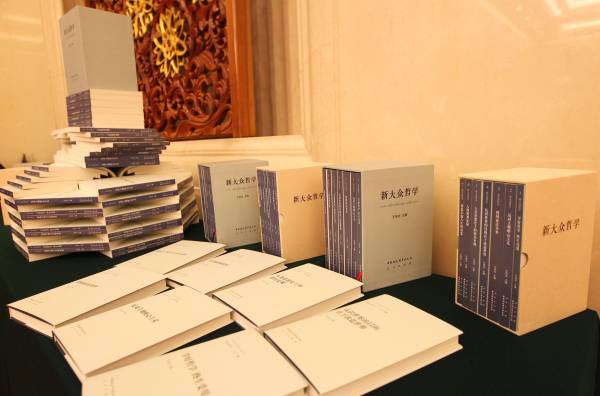New book brings philosophy back to life

New Philosophy for the Masses
Philosophy was widely accessible to the general public in the Mao Zedong era thanks to Philosophy for the Masses, a 1936 book by renowned Chinese intellectual and Marxist philosopher Ai Siqi (1910-66). The discipline, however, has gradually been divorced from reality due to an overemphasis on economic development. A new book has drawn acclaim for reconnecting the Chinese public with philosophy, especially Marxist philosophy.
New Philosophy for the Masses edited by Wang Weiguang, president of the Chinese Academy of Social Sciences (CASS) and published in September 2014, was the focus of a symposium from July 17 to 18 in Kunming City and Ai’s hometown of Tengchong County, Yunnan Province. The book has triggered discussion about how to localize, modernize and popularize Marxist philosophy in the current context.
In his speech at the event, Wang revealed why he was inspired to create a new version of Ai’s classic.
“Philosophy for the Masses has been in circulation for more than 80 years. Significant changes over this long period call for fresh philosophical thinking. Based on Ai’s model, I tried to offer some answers to reality from the perspectives of world outlook and methodology in an effort to carry on Ai’s great undertaking and cater to new requirements of practice, new expectations of the public and new needs of the Communist Party of China (CPC) and the country,” Wang said.
“China is now in the critical stage of deepening reform, facing complicated conditions and a variety of formidable tasks. Nevertheless, the grimmer the situation, the closer we should hold to the unique strength of Marxist philosophy,” he said.
Xia Xingyou, director of education affairs at the National Defence University PLA China, noted that many people have failed to gain a full understanding of the central government’s principle of “taking economic development as the central task,” which has “marginalized” philosophy in real world, “theorized” it in research and “vulgarized” it when linking to practice.
“This doesn’t mean there is something wrong with philosophy per se, but philosophical research and education in this age have gone astray,” he said.
“Born out of proletarian revolutionary struggle, Marxist philosophy has extraordinary vitality in that it targets, represents and serves the masses,” Xia said, adding that “bringing philosophy back to the masses” is required by Marxist philosophy, the socialist cause with Chinese characteristics and the effort to increase social consensus.
Eighty years ago in war-torn China, Ai pioneered the adaptation of Marxist philosophy to local conditions, the times and the masses through Philosophy for the Masses, leading countless youth to join the revolutionary ranks. Now, as the Chinese nation strives to build a well-off society comprehensively and forge China into a prosperous, democratic, civilized and harmonious socialist country, New Philosophy for the Masses has restarted a philosophy campaign for the masses at the right time.
Guo Jianning, a professor from Peking University, made reference to a third book, Popular Philosophy, which was written by Han Shuying, an expert in Marxist philosophy, and published in the 1980s. Philosophy for the Masses, Popular Philosophy and New Philosophy for the Masses constitute a trilogy for the localization, modernization and popularization of Marxist philosophy, he said.
The three volumes delve into realities and respond to urgent needs of their time, fully embodying the consciousness and persistence of Chinese philosophers in the popularization of Marxist philosophy, Guo said.
Wu Xiaoming, head of the Institute of Marxism at Fudan University, said scholasticism is against Marxist philosophy in the new context. If academic research of Marxist philosophy fails to apply dialectical materialism to analysis of current social development issues, it is “idealistic,” Wu said.
The symposium on the localization, modernization and popularization of Marxist philosophy was jointly sponsored by the China Association for Dialectical Materialism, the Publicity Department of the Yunnan Provincial CPC Committee and the Institute of Philosophy at CASS.
Deng Zhimei is a reporter at the Chinese Social Sciences Today.

 PRINT
PRINT CLOSE
CLOSE